#or that one interview in htr13
Explore tagged Tumblr posts
Note
Do you have any headcanons about what L would be like in a romance? Your vision of Near literally blessed me and I hope you can do L justice, since in the media people see him as not caring about a potential partner and that leaves me disappointed :(
I'm absolutely thrilled and charmed you've liked what I've spun about Near, I'm devastated to admit I don't think I can do L justice to this degree… he's wonderful, but I'm not an L scholar who can write (stops writing this reply to check how much I've written on Near) 10,000~ words worth of ardent meta about him… but I'll talk a bit about him and write out the headcanons I do have.
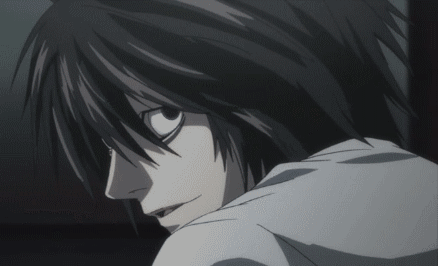
Scrutinizing everything Ohba and Obata say about L in all of their interviews, it's clear to me they originally envisioned L as a bit heartless. But all Death Note media since - the anime, the films, the Change the WorLd novel, the J-Drama, the DS games, the musical - all favor an interpretation of L that's more compassionate and human. I have a crackpot theory that fan reception and Alessandro Juliani's (award-winning, I remind you) performance in the English dub influenced this shift, in a similar way to how a couple of Japanese videogames around that time got re-released in Japan with script changes influenced by English localizations (such as Treehouse's localizations for Animal Crossing: Population Growing! and Animal Crossing: Wild World).
Example: in HTR13, Ohba and Obata say that L was lying when he called Light his first friend. No other media since treats this as a lie. Especially in Change the WorLd - L wears Light's watch for the remainder of his life. Also, the novel and film are explicit that L is affected by the horrible things he's witnessed while solving cases and cares about justice for the victims. The novels aren't written by Ohba and Obata, but they did have oversight and endorsed M's work on publication (though perhaps not as passionately as Nisio Isin writing Another Note).
All this to say I think pinning down the "true" L is difficult. I will say that I reject any interpretation of L as callous and uncaring, the same way I reject interpretations of Near as wholly unemotional.
In romance, I think he is basically as he appears in "L the ProLogue to Death Note: Spiraling Trap". He is enigmatic and somewhat difficult to earn the trust of, but he cares deeply about the people in his circle of trust. I don't have a screenshot on hand, but there's a line in the game where he says he'd be disappointed with himself if he ever let (you) get hurt or endangered. This is L. In Death Note's canon, we see similar things with the Japanese Task Force (recall how genuinely upset he is when Ukita dies).
Anyway, my honest thoughts on L romance, based on on a combination of the manga, anime and the DS game where the player can court him.
Earth-shatteringly good kisser, even though he's definitely never kissed anyone before. He's been orally fixated his whole life, he has S-tier instincts and rather lacks shame. Obviously, he's immaculate at oral sex as well. Just another thing in his long list of Mary Sue traits: genius savant, internationally recognized super detective, skilled at capoeria, English tennis champion... it's completely reasonable that this is just another one of those things he's perfect at on first try.
He's capable of being gentle but has a tendency to escalate - even brief, innocent kisses often spin out of control and transform into desperate grabbing and tangling tongues.
Verbally and physically demonstrative about his affections, when the mood takes him. L consistently shows himself to be a pretty bold personality who doesn't shy away from closing in on what he wants. He kind of just heedlessly does what he wants a lot of the time, doesn't he? That extends to when he wants to be around you, have your attention, be doted on, be entertained, kiss you, have sex with you etc.
In general, I would describe a relationship with him as "intense". He's an intense man. I can understand a dizzying range of headcanons for L, but any idea of him as "relaxed" or "shy" or "passive" or anything like that is just plain wrong and contradicts the person we see in every piece of Death Note media.
Thinks he's straight but is in reality gender agnostic when it comes to falling in love/being attracted to somebody. In Spiraling Trap he's confused if a male player gives him a Valentine's day chocolate, but in my view it's just because he's never given serious thought to himself with another man before. Once he starts developing a strong bond, he'll start to think differently and find that he thinks women and men equally appealing.
Has a bunch of kinks including (but not limited to) foodplay, shibari, feet (cliche but I really think so) and more I don't want to list here for fear of scaring people (nothing objectionable, just weird - by his own admission he's "strange").
For the life of me I can't imagine him as asexual, but if he is, he's the kind that finds sex and kink incredibly interesting on an intellectual level and likes to observe, even if he doesn't partake.
While writing this, I kept feeling compelled to compare him to Near, which is really funny and meta. Near was intentionally written by his authors to have a lot of L's traits as his "natural successor", but at the same time he's his own, completely different person. I don't mean to derail this into a Nearpost so I'll be really brief.
Broad strokes: As a lover, L is intense, confident and open. Near is subtle and withdrawn.
Both men prefer an educated, clever partner who can keep up with them intellectually, but their relationship secret spices are different. L is drawn to people who are interesting and offbeat in some way. Near is drawn to passionate, emotional people who he admires and feels invigorated by.
Things they have in common in love: they are both used to being waited on and getting everything they want, and so expect to be pampered (L with desserts, Near with requisition lists for toys). Detective work takes a lot of their time and they don't want a demanding partner who asks for a lot of time and attention. They don't suffer fools. They can be tactless with their partner on various matters, but don't mean to be malicious.
Things they're very different on in love: L can be fickle and mercurial, Near is more reliable and steadfast. L expresses his feelings verbally quite openly and enjoys just spending time with his lover, Near relies on gift-giving and physical affection to express himself, forever feeling a little shy and poor with words. L enjoys sex and is a natural at it, Near could go without and is average at best even with practice (sorry).
Now let's look at some pictures from Spiraling Trap together. (takes your hand)
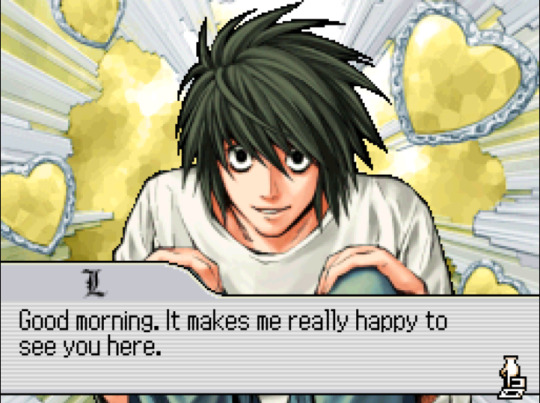
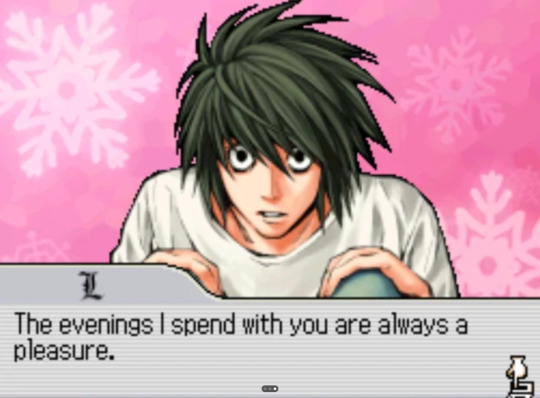
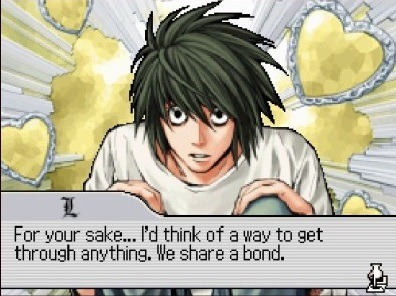
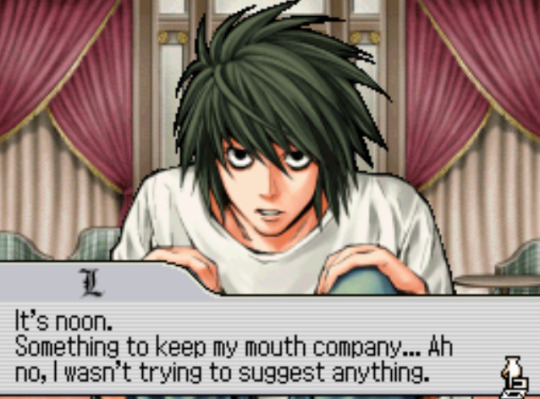
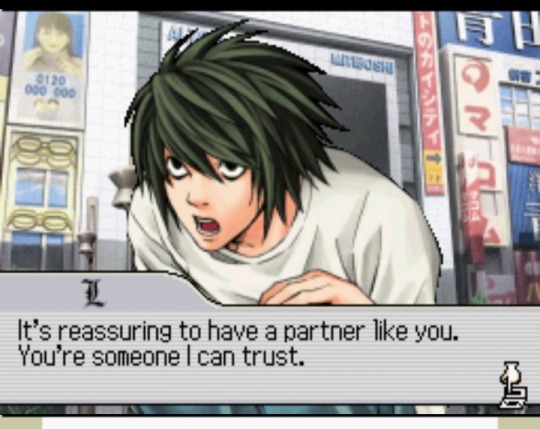
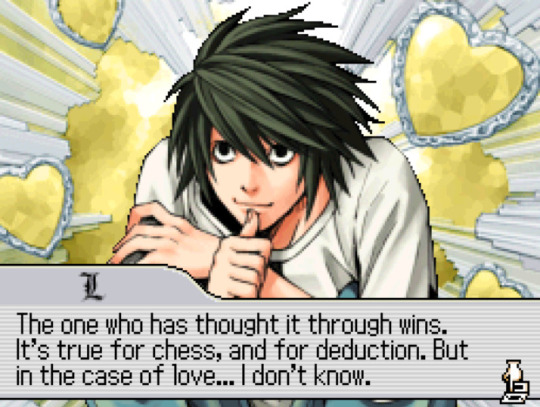
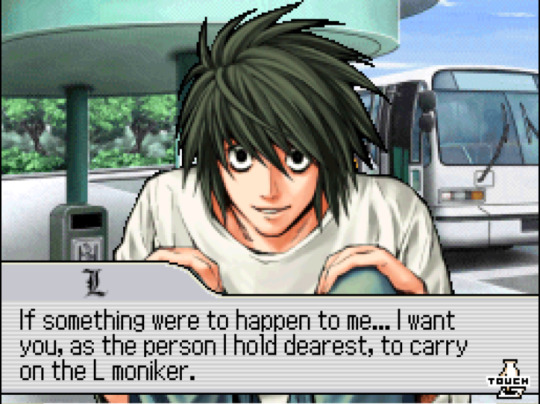
(Isn't it wild how this game suggests that he would consider granting his detective code to his lover on his passing if he had one? Fuck them Wammy's kids, I guess.)
136 notes
·
View notes
Note
I believe that Light loves his family but I want to clarify one thing: did author really said that he wouldn’t kill his father over 13-day rule? I heard it but I can’t find where he said it
Ohba didn't phrase it like that, no!
He said that he wanted to avoid having Light commit patricide in his HTR13 interview, but whether that is because he felt it would be OOC for Light or that he just didn't want to put something like that in his JUMP manga... Unclear!
In the manga, Light trails off in his thoughts when he thinks about the matter... so it's left open whether or not he'd have done it, or have kept finding excuses to make Soichiro keep writing names. I personally believe the latter based on the rest of the evidence in the manga, but there is no hard Word of God backing it up.
9 notes
·
View notes
Text
Okay, so I found a huge thread on Twitter about concept Ryuk and whether or not this art was supposed to be him. Maybe I’m totally wrong, but I can’t help but wonder if we accidentally spread that assumption with this post. Like, I don’t think I even had that note at the bottom when I originally published it.
So just for clarification, in an interview with the artist and writer of Death Note, it was stated that early on, making Ryuk look like a handsome human man was considered. Ultimately, they went with a more monstrous design. Here is the exact quote from artist Takeshi Obata: “My original idea for the pilot chapters was for Ryuk to look like a young man similar to Light but with black hair and wings. I had the notion that Shinigami should should look attractive like rock stars. But if he were more attractive that Light, Ryuk would appear to be the main character and things wouldn’t work as well. So then my editor told me that he didn’t have to look human…:
The image above is featured in artist Takeshi Obata’s art book, blanc et noir, and is actually most likely an original character of Obata’s. There was no mention in that quote about zombie-like skin there are no wings on the young man. In fact, given how finished it is, I’d suspect it’s simply one of Obata’s original designs, never intended for Death Note. It’s not a quick concept sketch, but fully fleshed out. There is also concept art is featured in HTR13, but iirc, none is seen of Ryuk, monstrous or otherwise so it’s very possible the human-like concept was only discussed and never actually even made it to the rough concept sketch phase.
So my apologies if we accidentally contributed to spreading this misconception. “We can only guess” was definitely a misleading phrase” and the image was used because it seemed… idk I don’t want to say “close” or “relevant”, but in the end, we needed an image lol.
As for other rumors you might hear that sound too surprising to be true (I’m talking to you, Death Note TikTok; stop falling for jokes made on Twitter)—they very well might be.

This image wasn’t actually confirmed to be of concept Ryuk, so we can only guess.
#Death Note#Ryuk#admin post#don’t even get me started on that TikTok rumor 😭#y’all making our jobs hard lol
236 notes
·
View notes
Note
hi! i saw one of your posts (or maybe it was @mikami ‘s) saying that L: Change The worLd was not part of the manga DN universe and just wanted to ask if the case was the same with the labb murder cases, I’ve always assumed it was canon due to the fact that beyond birthday’s serial killings were mentioned in the manga
Hi! It is included in the official timeline of events for the manga series in the How to Read Vol. 13 book. But I don't think that it was originally conceived by Ohba and Obata as something that was meant to be included in the manga timeline; I think it was mostly the brainchild of the writer NISIOISIN, and it was published shortly after the manga series ended as official Death Note affiliated content.
The way I picture it probably going is that Ohba just made up a name for a case that L remembered Naomi from without thinking up too many more details about it (as Ohba claims in the HtR13 interviews that he hadn't really fleshed out L's past at all whenever he first started writing him as a character):
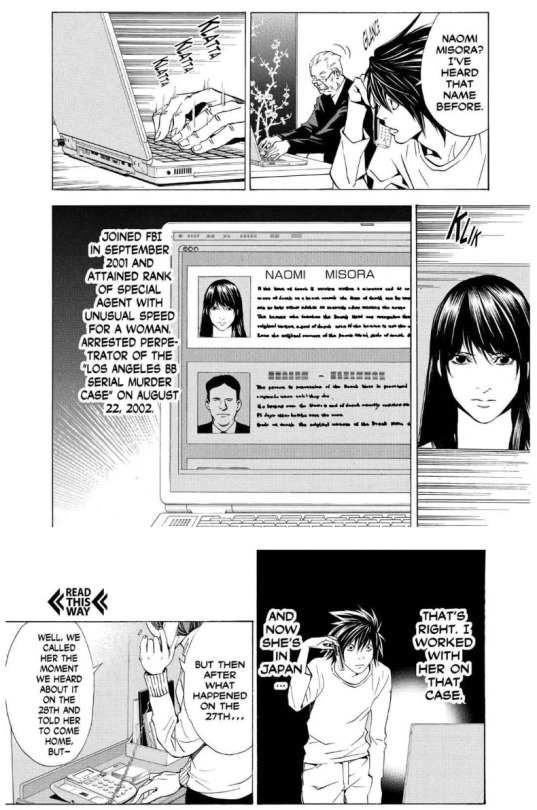
And then later on NISIOISIN (an established professional writer in his own right) wrote the novel, and he decided to take the name of that case from the manga and to make up the story behind it. I am not sure how much O&O collaborated with him on it, if at all. The cover art for it was made by Obata, and apparently Ohba has read it and seems to like it, because he mentions it a couple times in the HtR13 interviews. Though it also sounds like some of the things that were included in it were surprises to Ohba.
These were the references to the novel I could find again while skimming the behind the scenes book:
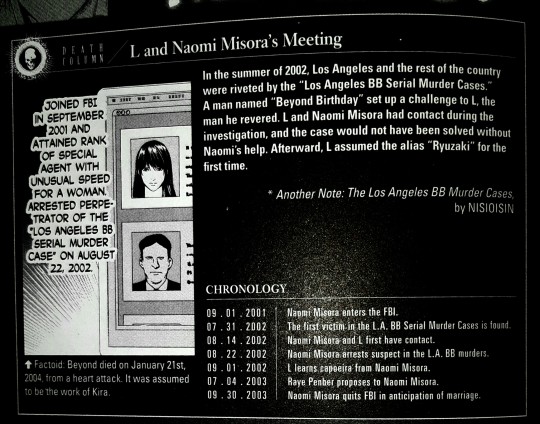
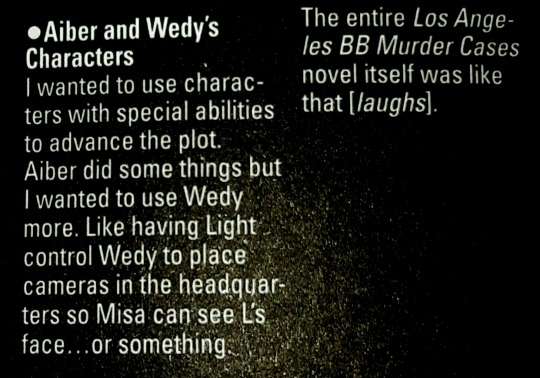
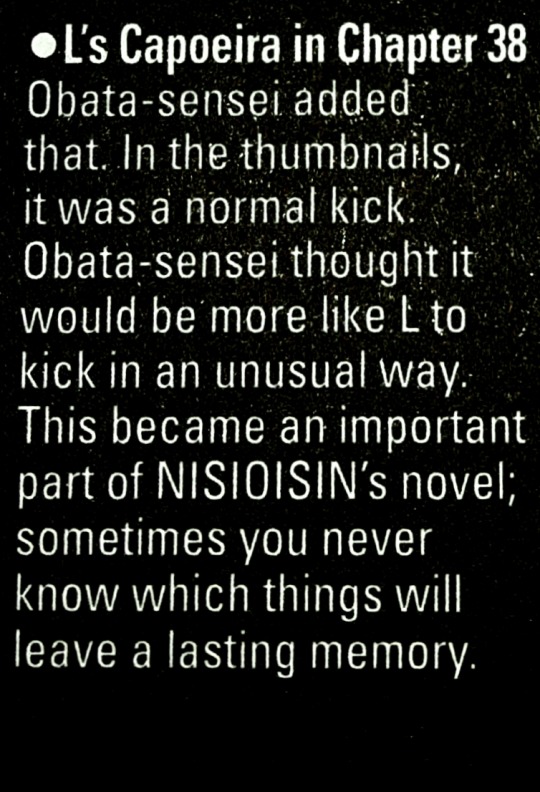
So I think how much you want to take it seriously as canon should be kind of up to you? The way I see it, if you couldn't get the story behind the LABB case from reading the manga itself then it technically shouldn't be considered canon to the same degree that the original manga story is, especially since it wasn't written by Ohba.
But that being said, I do like the novel, and I love B as a character. I like imagining it as part of the storyline too, and so do a lot of other fans. It does somewhat create plotholes for the manga timeline and make Wammy's edgier than it originally appeared as well though, so I don't necessarily take it all that seriously. I always prioritize the manga's version of characters and rules and events over the novel's, and if the novel ever conflicts with the manga I usually ignore the novel's spin on things in favour of the manga's. To me the novel is more so the canon source for stuff about B himself than for stuff about Wammy's and the other previously established characters, if that makes sense. In my eyes it's like a fun additional thing you can look to when creating fan content, but the main source of material for when I do critical analysis of the original story and so on is just the manga itself.
27 notes
·
View notes
Note
did Ohba try to make Near a likable character? or did he know fans wouldn't like him all that much?
Oh, Ohba definitely knew that Near would be controversial. He's very clear about that in is HTR13 interview.
He also left certain important things about him in Obata's hands—who dislikes Near—and while we don't really know how he feels about that, I doubt that he minds what Obata did with him (much).
Death Note is not known for its likeable characters, haha. You don't have one or several characters you obviously have to root for. Soichiro probably comes the closest, but he's not one of the main “players” in the story, but instead someone who’s essential to Light's character.
Still, Ohba also claims Near (plus Light) is the one he relates to most. He says it's because he doesn't leave his house often, but I think you can also tell by his little speech at the of the story, because those are his personal views.
But yeah, they were aware that same readers would see him as little more than a bad L copy.
13 notes
·
View notes
Note
Can you tell me what does HTR13 say about Near in regards to his motives and of L?
In one of the later interviews, Ohba and Obata talk a bit about Near’s ‘dark side’ and how that is expressed through his finger puppets (that’s also where the famous statement that Near doesn’t like L so he made his puppet ugly comes from, although to be fair that is mostly expressed by Obata, Ohba seems a bit surprised by that). They don’t talk a lot about his motives i think, but they do mention that Near’s even more against Kira than L was and that he’s a bit of a cheater...
Basically, I get the feeling that they might not have known what to do with Near so the Near we get and the Near they’re talking about are quite different... also, Obata seems not to like Near that much, he says he’s “his least favourite character, but fun to draw” lol
10 notes
·
View notes
Note
ok this is comparing apples and oranges, but didn't Ace Attorney stem from a parody/critique of the imbalanced Japanese legal system? (Prosecutors with high conviction rates, understaffed/overworked lawyers, the death penalty, culprits with higher chances of walking free). I wonder how Death Note compares in exploring these themes, whether they came to similar or different conclusions about the justice system...
Huh…that’s an interesting question. You’re right that Ace Attorney was meant to be a parodic critique, but I don’t actually get the impression that Death Note was intended to be a criticism of the criminal justice system. If anything it has a bit of a conservative bias between the lines, imo.
I’ll put the rest under a cut because this is a bit wordy. Please keep in mind that I’m not a legal expert so if anyone has any further insights or corrections to offer, I’d genuinely love to hear them.
To start with the most obvious point, Death Note famously just runs with the conservative talking point that the death penalty serves as an effective deterrent to crime. Within the world of DN, Kira has the miraculous effect of suppressing crime 70% and ending global warfare, which, frankly speaking, isn’t remotely realistic. But by treating it as “fact” in its own universe, it shifts the Oveton window to the right by making the discussion “Was Light justified given his results” instead of addressing the realities of the death penalty and its practical value by assuming the conservative talking point is accurate.
A few of the uglier facts about the Japanese criminal justice system are touched upon in DN. For example, the fact that L was able to detain and essentially try to torture a confession out of Light and Misa for over a month without either of them getting any legal representation or counsel? That’s not an uncommon phenomenon in Japan. Part of the reason that the high conviction rates of Japanese prosecutors exist is that they use extended periods of detainment to interrogate suspects in order to try and extract forced confessions. The suspects are legally supposed to have a defense lawyer, but that’s often ignored outright. Defense lawyers really have limited power, and are not required to be present for an interrogation.
It’s a bit of a vicious cycle because there is a lot of pressure on prosecutors not to lose court cases (b/c obvs that’s seen as incompetence) so they cherry pick cases they feel have a higher chance of conviction – which effectively means they take the cases where the suspect has confessed to the crime… either willingly or forcibly. It’s not that uncommon to hear of inmates on death row in Japan that claim they were forced to confess to crimes they didn’t really commit. This actually gets glossed over by the actual narrative of DN as it’s kind of taken for granted that other than the obviously innocent people (Naomi, FBI agents, etc) that the criminals that Kira targets are definitely responsible for committing the crimes they were accused of committing. Probably because the story mostly features detectives and this was published in Shonen Jump. Can’t lose the kiddies on complex social problems when you want them to focus on people trying to kill each other or something.
But that’s a bit of an aside – the normalcy of L’s unlawful and unconstitutional tactics is highlighted in how the task force is more or less complicit with L’s torture sessions. Not once is the subject of a lawyer ever brought up. Nobody tells L he’s taking things too far when he subjects Misa to water deprivation. There’s some vague notion of “feeling sorry for her” but nobody actually thinks its unwarranted. …And why would they? The task force members know that having a confession on file will make it more likely that Kira is tried.
Now in the actual story itself, I don’t see a clear tell that suggests Ohba condemns OR approves of L’s use of torture as it’s really presented as “this happens and then that happens.” But because Light and Misa were indeed guilty, the net effect is that it causes people to defend the abuse of authority and treating people as guilt until proven innocent. Again, I can’t speak to that being Ohba’s intent, but given that this tends to be brought up as anecdotal “proof” that torture should be allowed, I’d personally count it as conservative bias.
Further, Death Note also plays up the other side of the cherry picking by showing that there are plenty of people who do get away with crimes due to the flaws of the system. For instance, the robber who kills Misa’s parents never gets convicted because of “insufficient evidence” despite the fact that Misa witnessed the crime. The man Light murders in Shinjuku station to prove to Raye Penber that he is Kira is also a serial rapist who never got convicted for the same reason. (As another aside, sexual assault tends to go underreported in Japan due to stigma and shame for the victims, which is probably what partly feeds into Mikami’s zero hesitation over killing the guy who was trying to flip up a girl’s skirt on the train. Probably figures that the guy is a multiple time offender who’ll only keep doing that b/c nobody will speak up and report the guy otherwise). Anyway, it does highlight that there are flaws in the criminal justice system, but the way its framed the implication almost seems to be that the problem could be fixed if only the state had more authority and/or manpower to investigate, though I can also see how it can be inferred that the criticism is directed at prosecutors/law enforcement for not doing a proper job.
I mean tl;dr, Death Note largely presents the events as “this is a thing” without taking a side on it….. for the most part anyway. Ohba did state in one of his interviews in HTR13 that he didn’t want to focus on the morality/social issues, so much as moving the plot after all.
Keeping in mind that I haven’t actually played Ace Attorney past Apollo Justice and may very well be missing a couple of point the new game might’ve made past that, I think the AA series by and large takes more issue with suspects not getting adequate legal representation and abuse of state authority than Death Note does by highlighting cases where the defendant isn’t actually guilty. But at the same time, I don’t think AA argues the death penalty ought to be abolished either – between the lines, the goal is always on making sure the right person gets the death penalty. It’s just kinda assumed that if you definitely committed the crime and are handed a death penalty sentence, that’s a job well done. In the context of AA, I don’t think that’s really a suggestion that the death penalty should be kept because it deters crime, but it’s a built in assumption that the death penalty definitely has a role in the correct instances.
Ofc, it’s also a video game and playing a defense lawyer taking on an appeal case for sentence reduction to life imprisonment w/o parole for a convicted criminal just isn’t as ~dramatic~ as saving a totally innocent person from the gallows; the game was never going to be that nuanced by design, haha.
13 notes
·
View notes
Note
This is pretty random but do you know if Ohba said something about why Light was so cold towards Misa? I heard something like this in fandom but I don't know if this is a rumor or not. And if it's true, can you tell me what Ohba said?
There is one interview quote from HTR13, yes!
Q: So why didn't you have Mello kidnap Misa?
A: There was a danger that Light would have just killed her (laughs). Light loves his family and only wants righteous people in his new world. Though his desire to become God has twisted his views, he's still trying to make a better world. But Misa is a murderer in his eyes and thus evil, so he treats her coldly and takes advantage of her.
23 notes
·
View notes
Note
I sometimes wonder if Ohba wanted to kill L off from the beginning or not. when did he came up with it do you think?
Well, in his HTR13 interview he says letting Light and L's battle end where did was one of several ideas right from the beginning. And that he decided on it during Misa's confinement
7 notes
·
View notes
Note
is there anything especially interesting in the anime guidebook that you could share with us? :-]
I'm not sure what is most interesting here, so let me sum up what it is in the book! It's a pretty slim 160 pages.
It starts with some pretty barebones profiles of the characters, with the basic data points from HTR13 and few-line summaries.
Then it goes through every episode with screencaps of it and summaries. There might be a little commentary there that isn't just summary, but since I haven't read it properly... I am not sure.
Strewn in between are design arts of the various locations in the anime, which is probably my favourite part of the book. I will share those under the read more at the bottom!
This is followed by an interview with the voices of Light and L, and then another joint interview with the voices of Misa and Rem.
Then we get staff interviews with Tetsurou Araki (director), Toshiki Inoue (main writer) and Masaru Kitao (animation director).
Much shorter few-question Q&As with the voices of Mello, Near, Takada, Mikami, Soichiro, Sayu, Ryuk and... Jealous follow. Why Jealous?? I'm not sure.
There's also one-page interviews with the bands that performed the two opening themes: Nightmare and Maximum The Hormone.
Ohba and Obata also each get about a page of interview.
The book is then concluded with settei art for the characters and important objects. Nothing there is much of a revelation.
... so yeah, you'd have to read the text to see just how interesting this could possibly get, and I have yet to try and stumble through.
LOCATION ART BELOW THE READ MORE NOW~
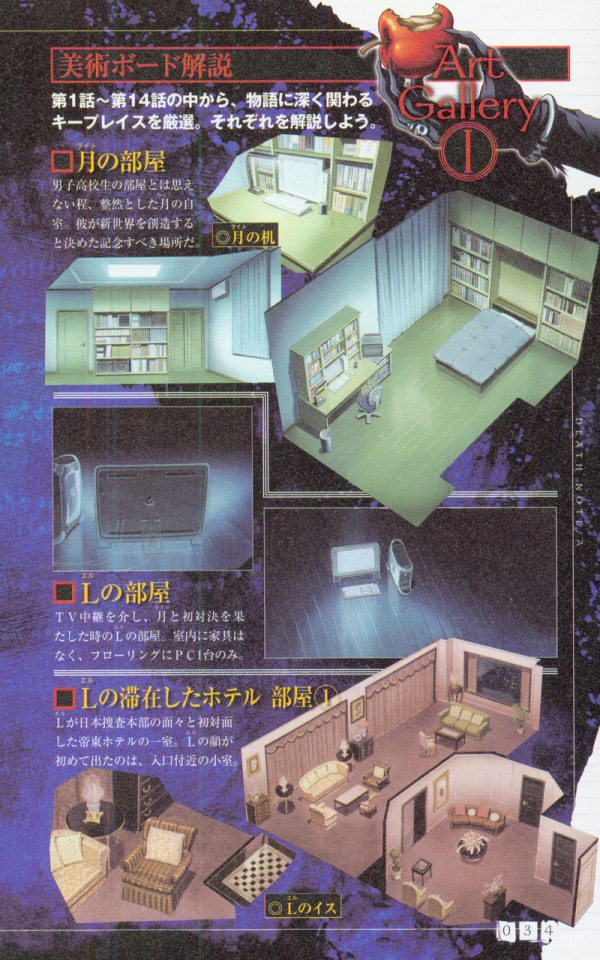
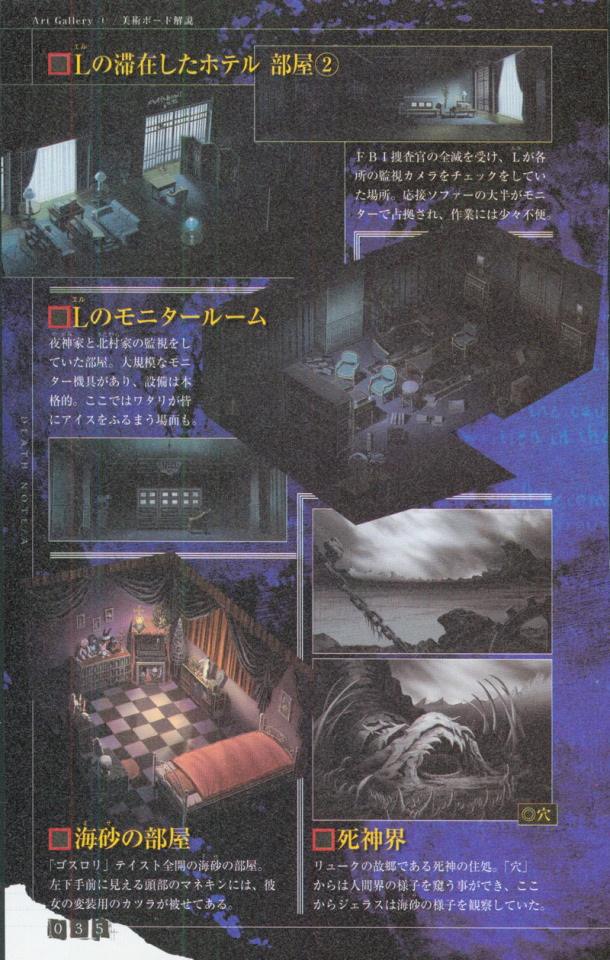
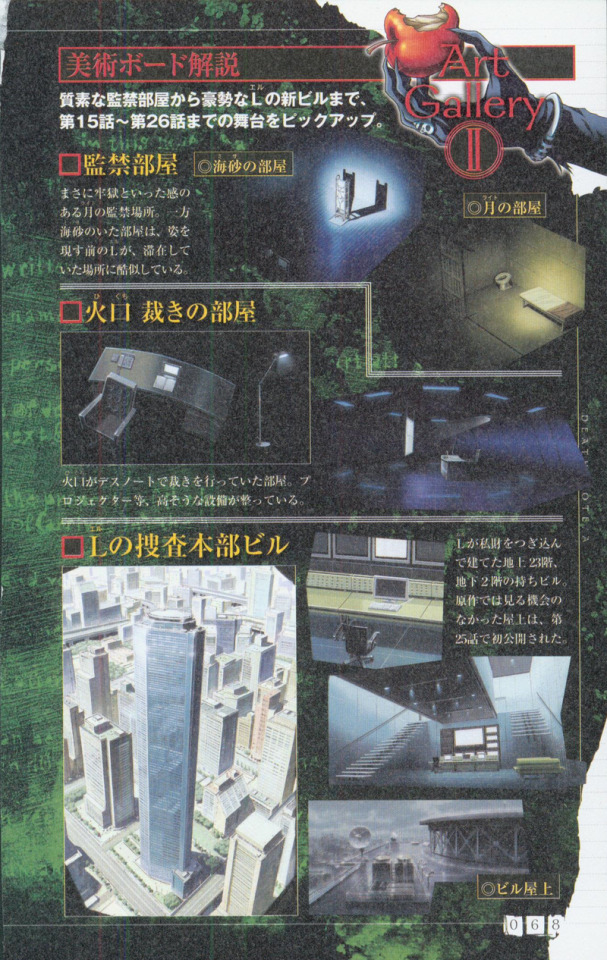
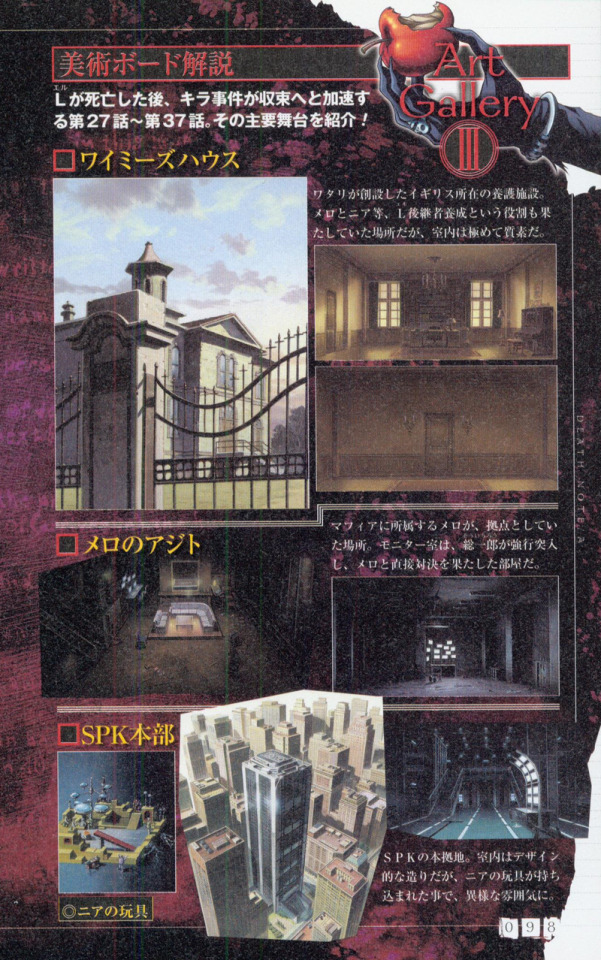
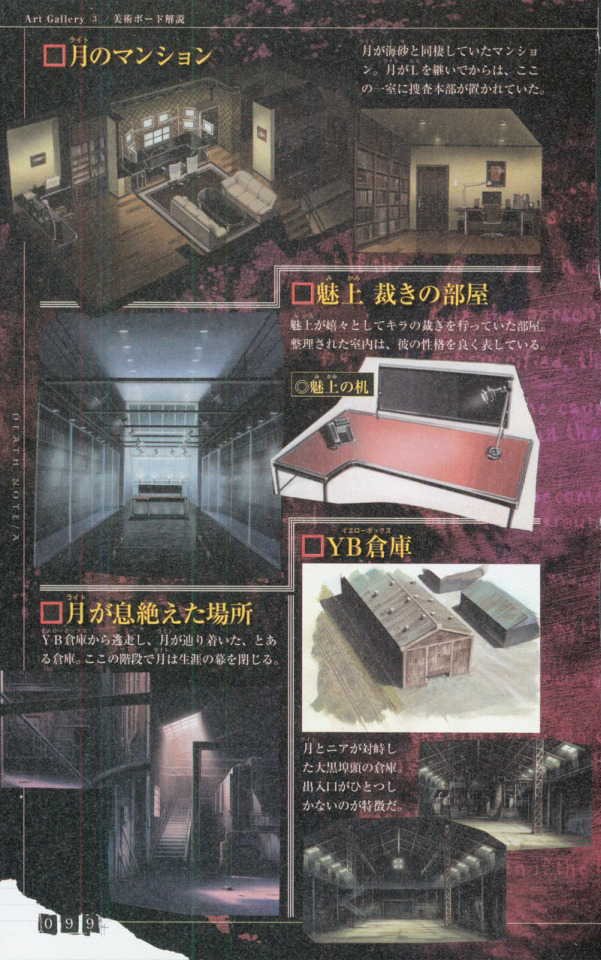
17 notes
·
View notes
Note
Is it true that Ohba had the ending of death note planned around mid series but had been forced to continue it by publishers because of it success and money? If it's true did Ohba said anything about what kind of ending they had planned?
He has not made any such statements. I think this rumor comes from speculation based on the statements about the industry made in Bakuman, which is a manga about writing for JUMP.
What he has said about the ending in HTR13 (which is pretty much the one big body of interviews we have available, really) is this:
He initially played with the idea of having L win and Light die, but then decided against it. He says he was able to publish the series “pretty much as he envisioned it”.
Having L die midway is one of several ideas he had at the very beginning of publication - he finalized that it would happen at the time he wrote the chapters with Misa’s arrest.
While he planned to have Light die and end on the “all people go to MU (nothingness)” thing from the start, the exact specifications of how that happens kept changing while he wrote - at a point, he thought to maybe let Mello be the one to defeat Light but then discarded the idea in the name of keeping up narrative tension.
So there really is no “true” ending that was an initial idea, just “Light dies” and a bunch of constantly shifting ideas around it until we got what we have.
23 notes
·
View notes
Note
What i really hate about dn fandom is everyone here are at war about "whose the smartest character" and forgetting about all other important things of the story and characters. First time i watched the death note i got the impression that L and Light are intellectually equals, but after joining the fandom I'm not sure if i think this way because it would be more satisfying for me if they were equals or they are actually equals. Since you're one the people who hate this arguments (you're not biased) and you know a lot about death note, you think my impression can be correct? And is there any canon data we have that Obaha saying something in contrary with this?
There is contrary data but there is also contrary data that is contrary in the other direction, so in my opinion it cancels out, haha.
According to the databook Light’s intelligence is at 10/10 while L is at 9/10, but the author interview answer Ohba gave when being asked for the smartest character was that it was L. (Obata answered that it’s Near.)
The segment in HTR13 that talks about what would have happened if Light had not found the Death Note states that he would have become a detective working on the same level as L.
So in the end, it is not a question official canon is particularly concerned with. Fandom loves debating it and I suppose that is by design, but I really think that after a certain level of ‘genius’ any comparison becomes null and void. It’s just useless. What there is is different aptitudes in different fields of intelligence and the cat and mouse between the genii in Death Note is primarily about exploiting those biases of the respective other genii. Who is ‘smarter’ depends on the playing field.
I personally would absolutely call L and Light equals intellectually. Any minute differences between them really do not matter.
Really, I do not think you are wrong to think so either - with HTR13 naming each of them the smarter one once, it’s anyone’s guess again.
26 notes
·
View notes
Note
About the translations in HTR13, in character charts there's "知識" that translated to "Intelligent" (I've seen this been translated to this word in Spanish, Germany and two different translations of English) which I've seen in the fandom people say the actual translation is "Knowledge". And there's another part in the chart i don't know the excat Japanese word, but in some of the translations is "Motivation" and in others is "Emotional Strength". I'm really confused, do you know anybody who knows Japanese enough to say which translations is correct? Also i don't get it why the translations are so different in different languages..
God, I had completely forgotten about this translation controversy, thank you for reminding me! Looking the word up in a JP-ENG dictionary does indeed give you knowledge, but since every professional translation opts for ‘intelligence’ instead I assume there is a nuance that the dictionary doesn’t provide.
My best attempt at figuring it out was to look it up in a monolingual Japanese web dictionary. It lists ‘common sense’ as a synonym and the definitions seem to place emphasis on to know and understand - which leads me to believe the word means more than just plain ‘information you have in your head’. That might be why intelligence gets chosen as a translation?
The question in the interview segment that asks who the smartest is uses the expression “頭がいい” (lit. to have a good head) so it doesn’t help as reference...
I admit defeat here. My Japanese is not good enough for it and I don’t know anybody who speaks it well enough and who I am close enough to do feel comfortable bothering about it, haha. I have posed the question on twitter in Japanese and maybe one of my Japanese mutuals will swoop in and help, but we shall have to see.
The word for ‘emotional strength’ meanwhile is 精神力. According to Japanese-only dictionaries it means something like ‘mental power to get through something’ or ‘strength of will’, so honestly, I think both emotional strength and motivation are adequate enough translations. Maybe ‘willpower’ would get close-ish to the nuance in English?
But again I am only a girl with a penchant for cross-referencing dictionaries, so anyone who is actually fluent in Japanese, PLEASE feel free to weigh in.
11 notes
·
View notes
Note
L looks like he'd smell like death incarnate, but knowing him, he's likely hygenic, just very neglectful. It really could go either way, so either: a) L brush teethies and takes a shower or b) L smells like an anime con if it grew legs. Teethies no brush. I love this L hygiene discourse.
Happy Birthday, L. What a good day for this.
Since we’re still talking about this, I’ve actually decided to go back to the interviews and check what Ohba and Obata have to say on the matter.

This is what Obata says in the artbook. In HTR13 (p. 127) he says again that he wanted to represent that L doesn’t care about clothes - and that he probably owns several sets of this outfit. A good point towards “L actually changes sometimes, thank god, it’s not the same outfit through the whole manga.”

This is re-iterated in the “L: One Day” oneshot, which I don’t count as canon but which at least does give some indication on how L’s meant to be seen.....

..... in his human washing machine.
#I DO NOT ACCEPT THE WASHING MACHINE AS CANON JUST AS I REJECT A LOT OF THOSE ONESHOTS#but I do think the argument is that L is meant to be cleanly#even if otherwise unoccupied by appearances#answers#Anonymous
48 notes
·
View notes
Note
I heard the DN manga was originally supposed to last half as long as it did (which tbh kinda makes sense given Certain Events). Do you know if this is true and and do you know or suspect how it was originally supposed to end?
I think that one of the ideas they had in mind for ending the series initially to have it end at the Light and L battle, and that it probably was extended to include the successor arc because the series turned out to be so successful. There are many parts in the behind the scenes HTR13 book where Ohba and Obata both talk about how much they were flying by the seat of their pants with this stuff, how a lot of the story wasn't actually set in stone from the beginning, and how difficult it was to come up with the successor arc so quickly. I have included some of the most relevant bits from their interviews below:
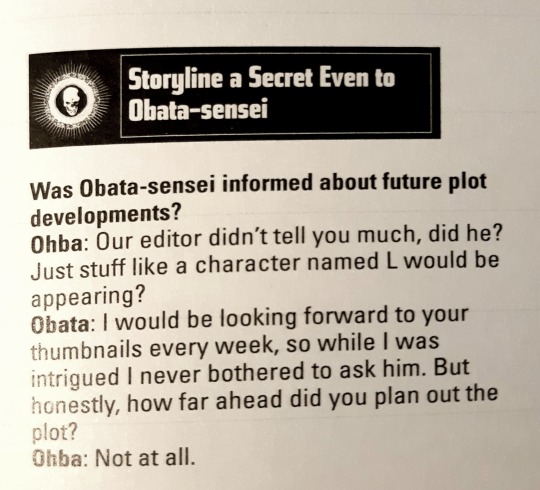
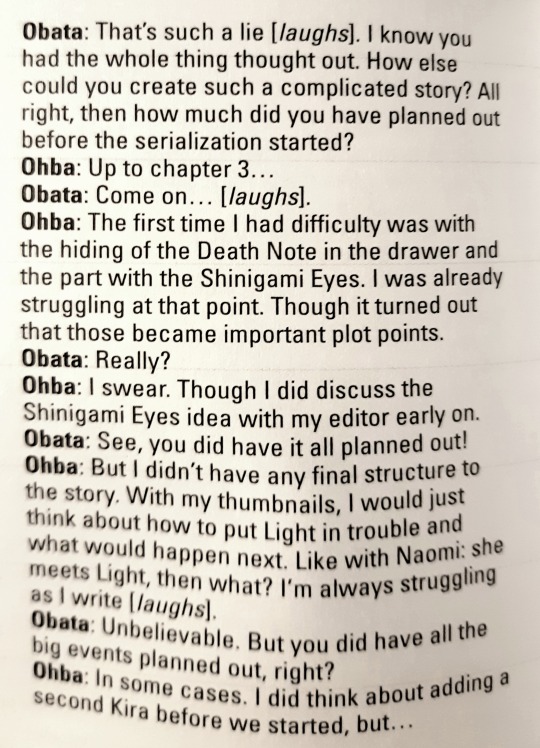
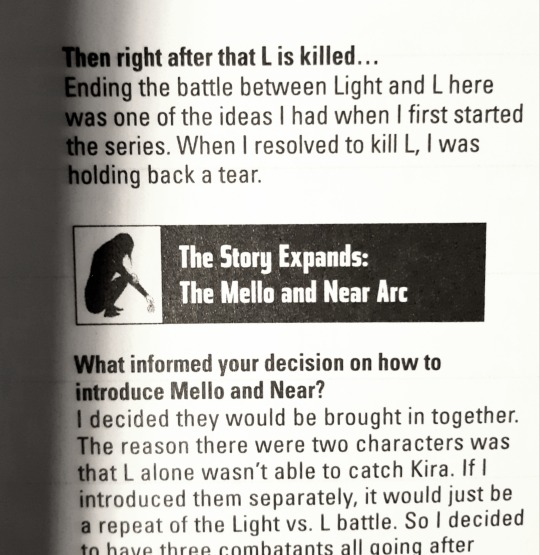
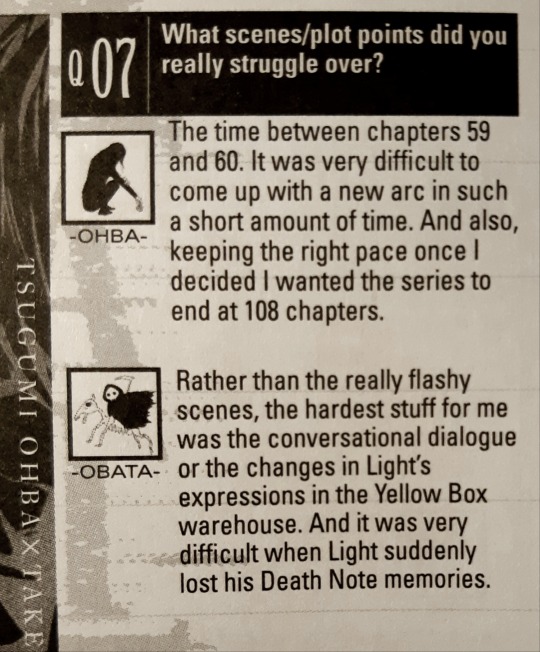
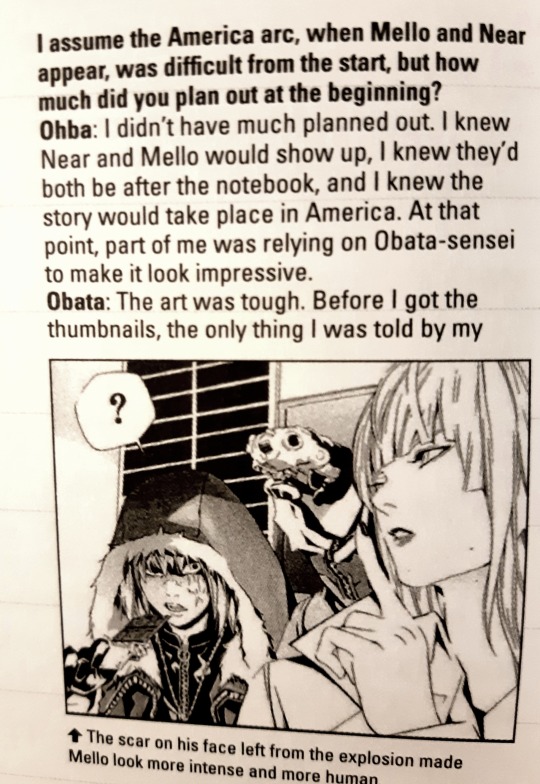
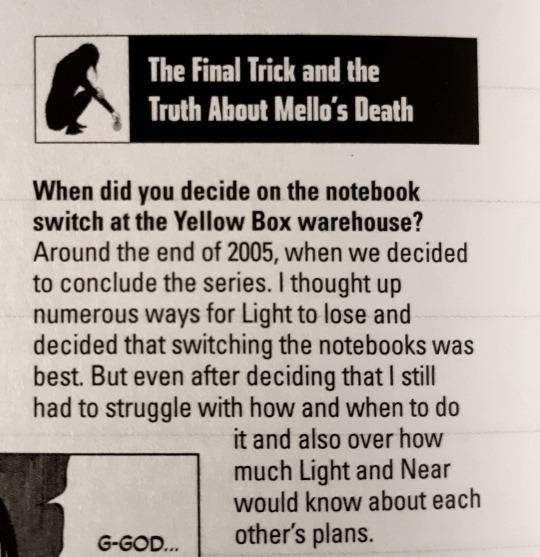
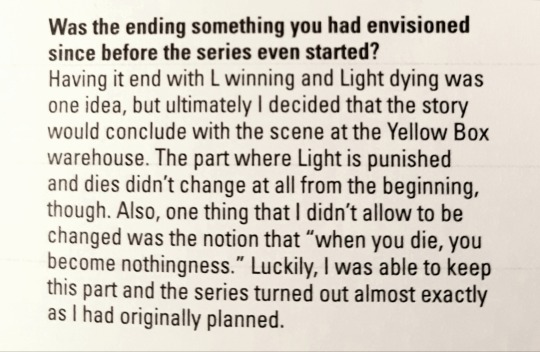
64 notes
·
View notes
Note
Ohba is a homophobic, but you think that Obata is one too? I know they share some opinions, but not all of them
I genuinely have no way of knowing this at all. Like, evidently Obata illustrates all this bullshit, but that’s also his job that he literally gets paid for. He and Ohba hardly even talk to one another. And I don’t know anything about Obata personally, I never even read more interviews than HTR13.
And as a side note, I don’t think Ohba is like... super violently homophobic, but he is Annoying Ass Fuck homophobic and as such, I am annoyed as fuck, haha.
13 notes
·
View notes